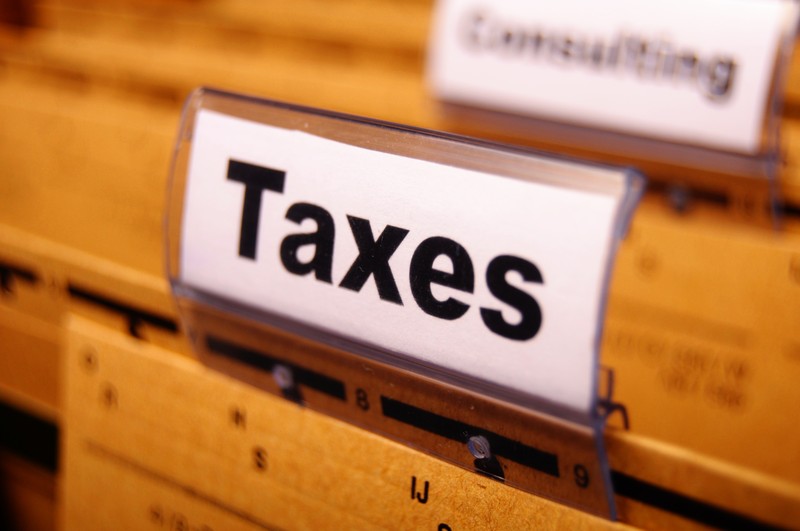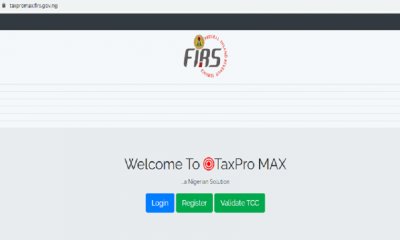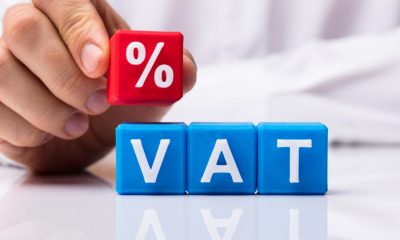Economy
Stakeholders to Discuss Stronger Tax Regimes in Abuja

By Modupe Gbadeyanka
Vice President of Nigeria, Prof. Yemi Osinbajo, has been scheduled to declare open the 3rd International Conference on Tax in Africa (ICTA) taking place in Abuja from September 25 to 29, 2017.
During the flagship conference of the African Tax Administration Forum, stakeholders will discuss stronger tax regimes under the theme ‘Building Strong Domestic Tax Regimes in Africa: Strengthening VAT, PIT and CIT.’
The conference program is designed along expert panel discussion sessions and presentations. The ICTA 2017 will look at the technical challenges, successes and good practice in the administration of VAT in Africa; enhancing performance of PIT through broadening the tax base, sanitising the taxpayer register and improved taxpayer experience with regard to managing compliance; and dealing with complexities of CIT taking into account the filing of corporate tax returns, enhanced customer service delivery, corporate structures vis-à-vis tax planning, tax audits and investigation.
This year’s ICTA is expecting delegates and panellists well beyond its 38-member countries including from other revenue authorities and organisations such as the African Development Bank, the World Bank, OECD, International Tax Compact, GIZ, Tax Justice Network – Africa, ECOWAS and CREDAF.
The programme will also celebrate and recognise the six African experts selected to serve on the UN Committee of Experts on International Cooperation in Tax Matters.
Five of the six members come from ATAF member countries and two of these are on the ATAF council. These include Mr William Tunde Fowler (Nigeria), the Chairperson of ATAF’s Council and Mrs Elfrieda Stewart Tamba (Liberia).
A statement issued by ICTA said to end poverty and hunger by 2030, the UN’s 17 Sustainable Development Goals (SDGs) are premised on strategies that build economic growth to address a range of social needs including education, health, social protection, and job opportunities, while tackling climate change and environmental protection. Tax revenue, is therefore viewed as the main enabler for achieving these goals.
The African Union, for its part, has set Agenda 2063 to build “an integrated, prosperous and peaceful Africa, driven by its own citizens and representing a dynamic force in international arena.”
To fulfil this vision, Agenda 2063 talks of the need for inclusive growth and sustainable development as well as good governance, democracy, respect for human rights, justice and the rule of law. To bring this agenda into fruition, domestic resource mobilisation takes a central role, as donor fatigue is now only too evident.
African countries are signatories to both these ambitious milestones. For ATAF, continent meeting both these agendas will, largely hinge on effective domestic resource mobilisation (DRM) or strengthening domestic tax regimes in every African country. In light of this, both the Forum’s Council as well as its General Assembly have given the directive for a strong focus on domestic taxes, hence the theme for ICTA 2017.
The Conference is focusing on specific domestic taxes including VAT, Personal Income Tax (PIT) and Corporate Income Tax (CIT) due to their potential contribution and the underlying risks that are likely to undermine the revenue take.
Value Added Tax (VAT) is administered in 44 of the 54 African countries and is seen as the tax of the future as it has a broad base and therefore, needs review of processes for effectiveness and efficiency in its administrations.
Corporate Income Tax (CIT) is in the spotlight as more manufacturing industries take root in the continent. Similarly, there is a growing service sector constituting the financial, telecommunication and real estate.
Personal Income Tax derived from individuals such as employee PAYE, other withholding tax schemes and High Net Worth Individuals (HNWI) are also key contributors to domestic revenue.
These tax heads have a quicker turn-around time if well administered in terms of taxpayer registration, return filing and payment, audits, collections, refunds and dispute resolution and can readily contribute to financing recurrent budgets of the African continent.
Economy
NGX Market Cap Surpasses N110trn as FY 2025 Earnings Impress Investors

By Dipo Olowookere
Investors at the Nigerian Exchange (NGX) Limited have continued to show excitement for the full-year earnings of companies on the exchange so far.
On Friday, Customs Street further appreciated by 1.01 per cent as more organization released their financial statements for the 2025 fiscal year.
During the session, traders continued their selective trading strategy, with the energy sector going up by 2.47 per cent at the close of business despite profit-taking in the banking counter, which saw its index down by 0.11 per cent.
Yesterday, the insurance space grew by 2.16 per cent, the industrial goods segment expanded by 1.70 per cent, and the consumer goods industry jumped by 0.42 per cent.
Consequently, the All-Share Index (ASI) increased by 1,722.13 points to 171,727.49 points from 170,005.36 points, and the market capitalisation soared by N1.106 trillion to N110.235 trillion from the N109.129 trillion it ended on Thursday.
Business Post reports that there were 59 appreciating stocks and 19 depreciating stocks on Friday, representing a positive market breadth index and strong investor sentiment.
The trio of Omatek, Deap Capital, and NAHCO gained 10.00 per cent each to sell for N2.64, N6.82, and N136.40 apiece, as Zichis and Austin Laz appreciated by 9.98 per cent each to close at N6.72 and N5.40, respectively.
Conversely, The Initiates depreciated by 9.74 per cent to N19.45, DAAR Communications slumped by 7.32 per cent to N1.90, United Capital crashed by 6.55 per cent to N18.55, Coronation Insurance lost 5.71 per cent to quote at N3.30, and First Holdco shrank by 5.53 per cent to N47.00.
The activity chart showed an improvement in the activity level, with the trading volume, value, and number of deals up by 33.77 per cent, 93.27 per cent, and 10.63 per cent, respectively.
This was because traders transacted 953.8 million shares worth N43.1 billion in 51,005 deals compared with the 713.0 million shares valued at N22.3 billion traded in 46,104 deals a day earlier.
Fidelity Bank was the most active with 92.4 million units sold for N1.8 billion, Chams transacted 69.2 million units valued at N310.9 million, Deap Capital exchanged 59.1 million units worth N382.7 million, Access Holdings traded 57.2 million units valued at N1.3 billion, and Tantalizers transacted 48.6 million units worth N228.2 million.
Economy
Naira Retreats to N1,366.19/$1 After 13 Kobo Loss at Official Market

By Adedapo Adesanya
The value of the Naira contracted against the United States Dollar on Friday by 13 Kobo or 0.01 per cent to N1,366.19/$1 in the Nigerian Autonomous Foreign Exchange Market (NAFEX) from the previous day’s value of N1,366.06/$1.
According to data from the Central Bank of Nigeria (CBN), the Nigerian currency also depreciated against the Pound Sterling in the same market window yesterday by N2.37 to N1,857.75/£1 from the N1,855.38/£1 it was traded on Thursday, and further depleted against the Euro by 57 Kobo to close at N1,612.52/€1 versus the preceding session’s N1,611.95/€1.
In the same vein, the exchange rate for international transactions on the GTBank Naira card showed that the Naira lost N8 on the greenback yesterday to N1,383/$1 from the previous day’s N1,375/$1 and at the black market, the Nigerian currency maintained stability against the Dollar at N1,450/$1.
FX analysts anticipate this trend to persist, primarily influenced by increasing external reserves, renewed inflows of foreign portfolio investments, and a reduction in speculative demand.
In the short term, stability in the FX market is expected to continue, supported by policy interventions and improving market confidence.
Nigeria’s foreign reserves experienced an upward trajectory, increasing by $632.38 million within the week to $46.91 billion from $46.27 billion in the previous week.
The Dollar appreciation this week appears to be largely technical, serving as a correction to the substantial losses experienced from mid- to late January.
Meanwhile, the cryptocurrency market slightly appreciated, with Bitcoin (BTC) climbing near $68,000, up nearly 5 per cent since hitting $60,000 late on Thursday after investor confidence in crypto’s utility as a store of value, inflation hedge, and digital currency faltered.
The sell-off extended beyond crypto, with silver plunging 15 per cent and gold sliding more than 2 per cent. US stocks also fell.
The latest recoup saw the price of BTC up by 4.7 per cent to $67,978.96, as Ethereum (ETH) appreciated by 6.3 per cent to $2,021.10, and Ripple (XRP) surged by 9.5 per cent to $1.42.
In addition, Solana (SOL) grew by 7.3 per cent to $85.22, Cardano (ADA) added 6.1 per cent to trade at $0.2683, Dogecoin (DOGE) expanded by 5.4 per cent to $0.0958, Litecoin (LTC) rose by 5.2 per cent to $53.50, and Binance Coin (BNB) jumped by 2.3 per cent to $637.79, while the US Dollar Tether (USDT) and the US Dollar Coin (USDC) traded flat at $1.00 each.
Economy
Oil Prices Climb on Worries of Possible Iran-US Conflict

By Adedapo Adesanya
Oil prices settled higher on Friday as traders worried that this week’s talks between the US and Iran had failed to reduce the risk of a military conflict between the two countries.
Brent crude futures traded at $68.05 a barrel after going up by 50 cents or 0.74 per cent, and the US West Texas Intermediate (WTI) crude futures finished at $63.55 a barrel due to the addition of 26 cents or 0.41 per cent.
Iran and the US held negotiations in Muscat, the capital of Oman, on Friday to overcome sharp differences over Iran’s nuclear programme.
It was reported that the talks had ended with Iran’s foreign minister saying negotiators will return to their capitals for consultations and the talks will continue.
Regardless, the meeting kept investors anxious about geopolitical risk, as Iran wanted to stick to nuclear issues while the US wanted to discuss Iran’s ballistic missiles and support for armed groups in the region.
Any escalation of tension between the two nations could disrupt oil flows, since about a fifth of the world’s total consumption passes through the Strait of Hormuz between Oman and Iran.
Saudi Arabia, the United Arab Emirates, Kuwait and Iraq export most of their crude via the strait, as does Iran, which is a member of the Organisation of the Petroleum Exporting Countries (OPEC).
According to Reuters, Iran objected to the presence of any US Central Command (CENTCOM) or other regional military officials, saying that would jeopardise the process.
The current confrontation was sparked by more than two weeks of unrest in Iran that saw authorities launch a deadly crackdown that killed thousands of civilians and shocked the world. As reports of the deaths trickled out of Iran, US President Donald Trump threatened to strike Iran if any of the tens of thousands of protesters arrested were executed.
Meanwhile, Kazakhstan’s planned oil exports could fall by as much as 35 per cent this month via its main route through Russia, as the country’s top oil company, Tengiz oilfield, slowly recovers from fires at power facilities in January.
ING analysts have pointed out Iran’s neighbour, Iraq, and a disagreement with the US as another bullish factor for oil prices. It seems Iraqi politicians favour Mr Nouri al-Maliki as the country’s next Prime Minister, but the US thinks Mr al-Maliki is too close to Iran. President Trump has already threatened the oil producer with consequences if he emerges as PM.
-

 Feature/OPED6 years ago
Feature/OPED6 years agoDavos was Different this year
-
Travel/Tourism9 years ago
Lagos Seals Western Lodge Hotel In Ikorodu
-

 Showbiz3 years ago
Showbiz3 years agoEstranged Lover Releases Videos of Empress Njamah Bathing
-

 Banking8 years ago
Banking8 years agoSort Codes of GTBank Branches in Nigeria
-

 Economy3 years ago
Economy3 years agoSubsidy Removal: CNG at N130 Per Litre Cheaper Than Petrol—IPMAN
-

 Banking3 years ago
Banking3 years agoSort Codes of UBA Branches in Nigeria
-

 Banking3 years ago
Banking3 years agoFirst Bank Announces Planned Downtime
-

 Sports3 years ago
Sports3 years agoHighest Paid Nigerian Footballer – How Much Do Nigerian Footballers Earn





















